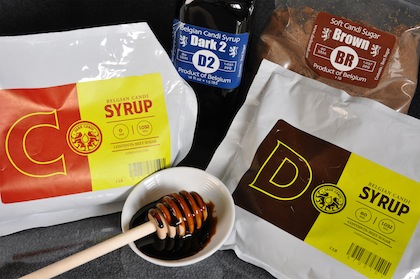At Bear Republic’s production facility in Cloverdale, CA, Brewmaster and COO Richard Norgrove is talking about his first exploratory trip to England and holding an old plastic jar. After explaining how that initial trip came about from a friend’s encouragement, looking back almost twenty years, Richard goes on to say, “I fell in love with a lighter style of beer that I normally wouldn’t get here in the States, which was a mild. And that kind of became the quest for a second trip, to go out and understand that style.”
In putting together the various pieces of adjunct usage in America, the phrase “necessity is the mother of invention” has come up on more than one occasion.
Inside the plastic jar, there’s a brown, viscous substance reminiscent of molasses, or dark maple syrup. It’s the same stuff that the English brewery Batemans uses in their Dark Mild, three-time CAMRA ‘Mild of the Year’ and a key influence on Norgrove’s (and others’) appreciation of that style. Martin Cullimore, Batemans’ Head Brewer and Director, showed him the key ingredient during one of his trips: the secret to making a 3 percent mild the color of a porter, but without the accompanying bitterness or roasted bite.

When Norgrove attended a brewmaster series being held at Marston’s, another English brewery, he had the opportunity to talk openly with a number of these local breweries. “All the brewers there, they had no problem telling us anything about English beers, how things were done. I had an opportunity to learn from them and then come home and incorporate some of these things into our beers. […] Martin was well enough to show me where and how he was imparting this really rich, dark character.”
Invert sugar. Essentially, sucrose (table sugar) broken down into simpler sugars, then heated so that the process of caramelization develops additional flavor characteristics. Easily fermented by yeast. Strongly aromatic. Batemans developed their processing methods with the assistance of a local confectioner.
We started our own series of experimentations within [Bear Republic], to kind of get an understanding of how different sugars were going to relate.” Richard explains their in-house setup: currently, some cut-top kegs with propane burners. He and Peter Kruger, Bear Republic’s Master Brewer, have already been discussing the next steps ahead of them. A copper confectionary kettle, constant stirrers, direct flames. Kruger adds, “At some point, we will have one sitting over in a little room that we can fire up.” Earlier in the conversation, there was mention of procuring a coffee roaster for roasting their own dark malts.
In putting together the various pieces of adjunct usage in America, the phrase “necessity is the mother of invention” has come up on more than one occasion. It comes up again today. We’re not talking about things that normally get discussed openly (although this is partly because usually no one bothers to ask). I’ve come here because I want to know more about these things: sugar additions, rice, corn. How these ingredients can be used to make beer better. How adjunct uses are changing and developing in America. And how these brewing tools may very well serve an important role in the future of craft beer.
Adjuncts in America
Depending upon whom you talk to, the definition of “adjuncts” with regards to brewing can vary widely. The dictionary definition of the word (granted, not one of the most frequently used words in the English language…) suggests something added, but not necessarily essential to the task at hand. Some brewers include spices and other things that can’t be fermented. Others limit it to only the ingredients that serve to lighten body and color, such as corn and rice additions. Old definitions still refer to anything that isn’t “Gersten, Hopfen und Wasser”: barley, hops, and water. One professional brewer, after being asked for his own personal definition of the word, replied, “Are you asking the German in me, or the American?”
That “added but not essential” part can vary depending upon context and culture.










